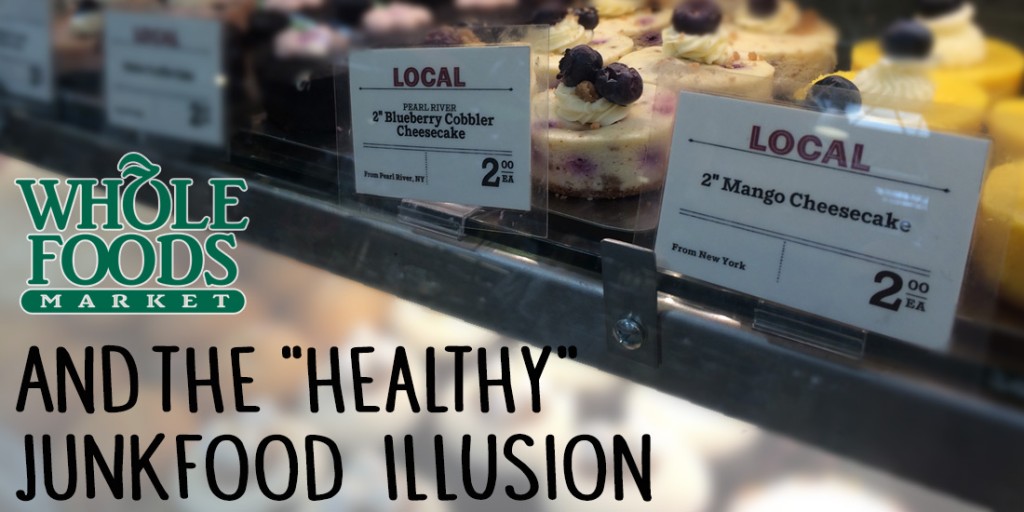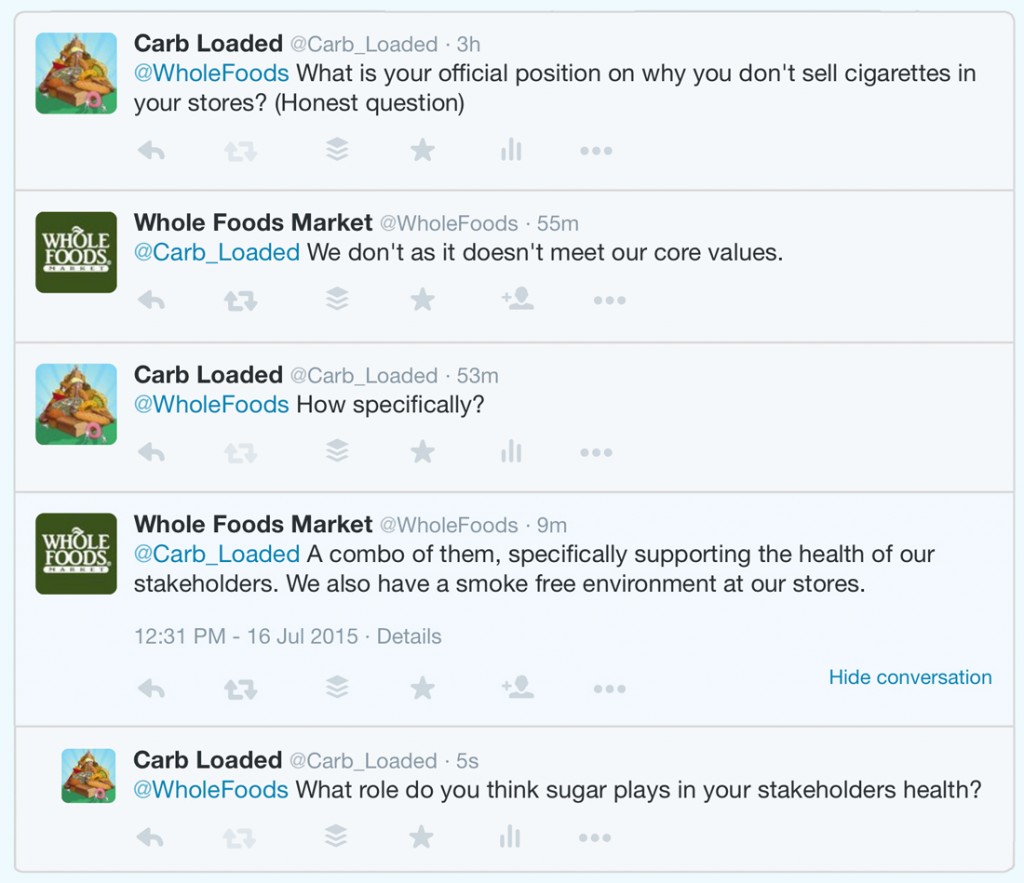 Let me start by saying I do much of my grocery shopping at Whole Foods. Once every week or so, you can find me in my local Connecticut store. Over the time that I have been shopping there, I have noticed an unfortunate trend. Nearly every visit I will witness someone filling their basket with “locally made” or “all natural” candy, cookies and cakes. Many times they stand by their cart while they carefully scrutinize the ingredients label. On my last visit, a woman behind me literally had her arms filled with stacks of cookies.
Let me start by saying I do much of my grocery shopping at Whole Foods. Once every week or so, you can find me in my local Connecticut store. Over the time that I have been shopping there, I have noticed an unfortunate trend. Nearly every visit I will witness someone filling their basket with “locally made” or “all natural” candy, cookies and cakes. Many times they stand by their cart while they carefully scrutinize the ingredients label. On my last visit, a woman behind me literally had her arms filled with stacks of cookies.
It breaks my heart every time I see it. For many consumers, there is an implied promise of health in the very act of shopping at Whole Foods. The fact remains that the middle aisles of Whole Foods are just like the middle aisles in any grocery store…a place that should be avoided. Much of the floor space at my local Whole Foods store is dedicated to candy, and believe it or not, cookies and cakes by the bulk.
Not surprisingly, this isn’t by accident. In 2009, John Mackey, co-founder and co-CEO of Whole Foods Market told the Wall Street Journal: “Basically, we used to think it was enough just to sell healthy food, but we know it is not enough. We sell all kinds of candy. We sell a bunch of junk.”
“…We sell all kinds of candy. We sell a bunch of junk.”
John Mackey, co-founder and co-CEO of Whole Foods
He said they would attempt to educate consumers in the ways of healthy eating: “There will be someone in a kiosk to answer questions, they’ll have cookbooks and health books, there will be some cooking classes. It will be about how to select food, because people don’t know.”
If that isn’t a statement designed to make you laugh out loud, I don’t know what is! It’s kind of like getting addiction counseling from a your drug dealer. We all know that the grocery business is a hugely competitive business with very tight margins. So obviously, at the end of the day this is a financial decision. Don’t think for a second that Whole Foods wouldn’t sell locally rolled cigarettes and organic artisan heroin if they could. I asked Whole Foods via Twitter why they don’t sell cigarettes at their stores. They gave me the following incomplete answer.

But is selling sugary products really that bad?
Sugar is Killing the Western World
To some, this might sound extreme. Let the facts do the talking:
Firstly, your body doesn’t know the difference between a Little Debbie snack cake and a Whole Foods “locally produced” dessert cake. Whether it is “all natural” or not; metabolically, sugar is sugar. True, different types of sugar sometimes behave differently. But they ALL elicit insulin. So don’t allow yourself to be fooled into thinking there is such a thing as “healthy junk food”.
Secondly, like cigarettes, sugar is deadly. In the United States more than 480,000 people die from smoking EVERY year (including deaths from secondhand smoke).
In 2014, worldwide diabetes caused 4.9 million deaths. That means that every seven seconds, someone dies from diabetes. Now please don’t feel like you need to defend sugar by saying that “sugar doesn’t cause diabetes,” because in fact it does! So far, it has been established that AT LEAST a quarter of all diabetes cases were brought on by drinking soda! This isn’t a secret. There are numerous books, blogs, and movies reporting on this. I suspect that in the near future, we will be hearing even more about sugar’s role in in the medical burden on society.
The Self-Deception of Healthy Junk
So what is the upshot of Whole Foods junk food hypocrisy? Something that Mr. Mackey said in that WSJ interview struck me. He said “Customers, we hope, are going to vote [junk] out. You’re just seeing the most tentative efforts at this point because the details are not ready for public release. You need to be fair. I’ve got to plan the revolution.”
Did you catch that? They will stop selling it when we stop buying it. This is of note because of who Whole Foods customers are. In a recent article about how Whole Foods chooses locations for it’s new stores, the Washingtonian states: “The chain counts on consumers who are willing to pay more because they know about the health benefits of eating organic or have a taste for less common foods.” A population’s education level is the number one factor they measure for placing a store in a community. That means that educated health conscious consumers are buying enough junk food at their local Whole Foods to keep it on the shelves.
This kind of self-deception is actually pretty common. If you search for “low carb recipes” on Pinterest, for example, you will find many of the most popular recipes are for cakes, cookies, pancakes, pies and breads. We literally want to “eat our cake and have it too”. Don’t get me wrong, sugar DOES have a place in our dietary lives. It should be a treat that we OCCASIONALLY enjoy, but it’s the regular consumption of sugar that is systematically destroying our health.
“The battleground isn’t in the candy aisle at our local Whole Foods,
it’s in between our ears.”
Therefore, the battleground isn’t in the candy aisle at our local Whole Foods, it’s in between our ears. We need to evaluate our personal attitudes about sugar and having something sweet with every meal. Dessert is something for a special occasion, not all occasions. As most aspects of a consumer society, we bring these types of problems on ourselves. The food industry is in the business of making products that we demand. Really, eating products is at the root of this challenge. Most, if not all, natural eating experts agree that eating ingredients, or real food, is FAR better then eating “natural” products.
While this might sound difficult, it can be done…enjoyably too! For ideas about eating real food, check out some low carb food ideas here; and be sure to check out websites like Livin’ La Vida Low-Carb, FoodTruth and The Diet Doctor.
Lathe Poland is one of the creators of the documentary film Carb-Loaded: A Culture Dying To Eat.

